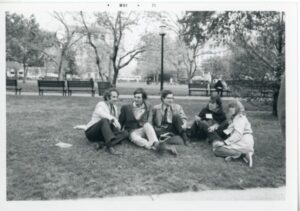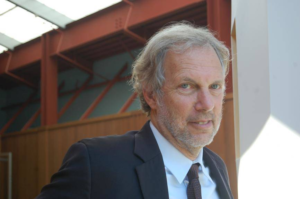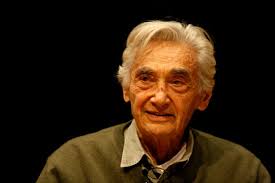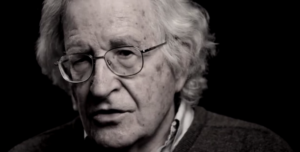Noam Chomsky & Robert Pollin: Humanity’s Fate Isn’t Sealed — If We Act Now
We live in extraordinarily dangerous times. Climate breakdown is upon us, yet nation-states and their leaders continue to pursue policies based on “national security” and the pursuit of geopolitical objectives. The transition to a clean and sustainable global energy landscape is hampered both by powerful interests linked to the fossil fuel economy and lack of international cooperation. In fact, the war in Ukraine, which runs on fossil fuels, is not only delaying climate action but has increased reliance on the very energy sources that drive global warming and poison the planet. Indeed, the war has been a godsend to the fossil fuel industry. “Drill, baby, drill” is back with a vengeance, and oil and gas companies are reaping unprecedented profits as families everywhere are struggling with skyrocketing energy costs.
To be sure, “savage capitalism,” as Noam Chomsky powerfully remarks in this exclusive joint interview with economist Robert Pollin, is unleashed today even more destructively than it has in the past. Yet, as Pollin so astutely points out, there are ways to tame global warming and make a successful transition to a sustainable future based on clean energy systems (which do not include nuclear power plants or so-called negative emission technologies). In fact, Chomsky and Pollin agree that, in large part, it is political will that stands in the way of securing the future of humanity and the planet. As Chomsky notes, the task of political education in the age of global warming is analogous to the task of philosophy as described by Ludwig Wittgenstein: “to show the fly the way out of the fly-bottle.”
Noam Chomsky is institute professor emeritus in the department of linguistics and philosophy at MIT and laureate professor of linguistics and Agnese Nelms Haury Chair in the Program in Environmental and Social Justice at the University of Arizona. One of the world’s most cited scholars in modern history and a critical public intellectual regarded by millions of people as a national and international treasure, Chomsky has published more than 150 books in linguistics, political and social thought, political economy, media studies, U.S. foreign policy and world affairs, and climate change.
Robert Pollin is distinguished professor of economics and co-director of the Political Economy Research Institute (PERI) at the University of Massachusetts-Amherst. One of the world’s leading progressive economists, Pollin has published scores of books and academic articles on jobs and macroeconomics, labor markets, wages, and poverty, environmental and energy economics. He was selected by Foreign Policy Magazine as one of the “100 Leading Global Thinkers for 2013.” Chomsky and Pollin are co-authors of Climate Crisis and the Global Green New Deal: The Political Economy of Saving the Planet (2020).
C. J. Polychroniou: Noam, the systemic impacts of the war in Ukraine are enormous and they include economic shocks, food and energy security, geopolitical dimensions, and climate change. With regard to the latter, while it is difficult to make an accurate estimate of the climate impact of the war in Ukraine, it is crystal clear that it hinders current efforts to curb global warming and may even alter long-term strategy on climate action and action plan. How exactly are the war in Ukraine and the climate crisis connected, and why are governments doubling down on coal, oil and gas instead of doubling down on the clean energy transition?
Noam Chomsky: An independent observer looking at the world today might well conclude that it is being run by the fossil fuel and military industries, or by lunatics. Or both.
The scientific literature is harrowing, regularly showing that earlier dire warnings were too conservative and that we are careening towards disaster at a frightening pace. Even without reading the literature, anyone with eyes open can see that nature is saying “enough”: extreme heat, huge floods, devastating drought and severe water crises, large regions of the earth approaching the point where they will soon be uninhabitable.
How are we reacting? The basic character is captured by a clip from the marvelous satirical journal Onion — except that it is perhaps even beyond their imagination. It is real. And reported, with disbelief, in the mainstream:
‘In a paradox worthy of Kafka, ConocoPhillips plans to install “chillers” into the permafrost — which is thawing fast because of climate change — to keep it solid enough to drill for oil, the burning of which will continue to worsen ice melt.’
In his bitter antiwar essays, Mark Twain wielded his formidable weapon of satire against the perpetrators. But when he reached the renowned General Funston, he threw up his hands in despair: “No satire of Funston could reach perfection,” Twain lamented, “because Funston occupies that summit himself…. [He is] satire incarnated.”
What is happening before our eyes is unleashed savage capitalism as satire incarnated. Even Twain would be silenced.
To see what is at stake, consider some basic facts. “Arctic permafrost stores nearly 1,700 billion metric tons of frozen and thawing carbon. Anthropogenic warming threatens to release an unknown quantity of this carbon to the atmosphere.… Carbon dioxide emissions are proportionally larger than other greenhouse gas emissions in the Arctic, but expansion of anoxic conditions within thawed permafrost and soils stands to increase the proportion of future methane emissions. Increasingly frequent wildfires in the Arctic will also lead to a notable but unpredictable carbon flux.”
The carbon flux may be unpredictable in detail, but the resulting devastation is all too predictable in its general outline. How then does unleashed savage capitalism respond? Simple. Let’s employ our best brains to find ways to slow the melting down a little so that we can pour more poisons into the atmosphere for profit, and as a side effect, release those Arctic permafrost stores into the atmosphere more rapidly so as to make life unlivable.
Unfortunately, the observation generalizes. We find satire incarnate wherever we turn, even in marginal corners. Thus, one argument against solar energy is land use. A real problem, especially in the U.K., where golf courses take up over four times as much space as solar power, so we learn from political economist Adam Tooze’s invaluable Chartbook.
Satire incarnate is just the cutting edge. It brings out dramatically the elements of dominant economic institutions that are lethal if unleashed. It would be hard to conjure up a more fitting epitaph for the species — or more accurately, for the institutions that have become dominant as what we call civilization marches forward. Read more
We Need A World Without Borders On Our Increasingly Warming Planet
As we witness an increase in global migration amid a growing anti-immigrant sentiment, it is vital to remember that migration is mainly an outcome of political and economic processes associated with imperial conquest and capitalist globalization. Yet both liberal and conservative media exhibit similar bias toward migrations by treating them as problems that stem “from over there,” Harsha Walia points out in an exclusive interview for Truthout. Instead of accepting these false terms, Walia argues, we must recognize “there is no crisis at the border and there is no crisis of migration,” but instead a crisis of global apartheid.
Walia makes a case for a world without borders.
Harsha Walia, born in Bahrain and living in Vancouver, British Columbia, is a leading Canadian organizer and writer. In 2001, she co-founded the Vancouver chapter of No One Is Illegal, an anti-colonial, anti-racist and anti-capitalist migrant justice movement, and has been active in various migrant justice, Indigenous solidarity, feminist, anti-racist and anti-capitalist movements over the past two decades. She is the author of several books, including Undoing Border Imperialism and Border and Rule: Global Migration, Capitalism and the Rise of Racist Nationalism.
C.J. Polychroniou: Europe and the United States are major destinations for people trying to escape war, political turmoil and poverty. In both places, the influx of “uninvited” people from foreign lands and cultures has generated an anti-immigration backlash and has led to increasingly harsh and even malicious policies in an attempt to deal with what is often referred to in the media and by experts alike as a “global migration and refugee crisis.” You have written extensively on the global migration crisis, so let me start by asking you to share with readers the way you understand and explain the factors behind this mass migration of people in the first part of the 21st century.
Harsha Walia: Conservatives and liberals alike conceive of immigration policy as an issue of domestic reform to be managed by the state. Language such as “migrant crisis,” and the often-corresponding “migrant invasion,” is a pretext to shore up further border securitization and repressive practices of detention and deportation. Such representations depict migrants and refugees as the cause of an imagined crisis at the border, when, in fact, mass migration is the outcome of the actual crises of capitalism, conquest and climate change.
In the U.S. context and the panic about the southern border, a long arc of dirty colonial coups, capitalist trade agreements extracting land and labor, climate change, and enforced oppression is the primary driver of displacement from Mexico and Central America. Hondurans, El Salvadorans and Guatemalans make up the fastest-growing proportion of people crossing into the U.S. Over the past decade, migration from these countries has increased fivefold. These perilous migrations are portrayed by liberal media as “not our problem” and stemming from “over there.” However, these migrations are “our problem” because they are inextricable from displacements created by U.S. dirty wars backing death squads across Central America and the counterinsurgency terror of the neoliberal “war on drugs.” From the war against the FMLN [Farabundo Martí National Liberation Front] in El Salvador to the coup to oust Honduran President Manuel Zelaya, there is an unbroken line of U.S. interventions in Central America. Migration is a predictable consequence of these continuous displacements, yet today the U.S. is fortifying its border against the very people impacted by its own policies.
As of 2016, new displacements caused by climate disasters are outnumbering new displacements as a result of persecution by a ratio of three to one. By 2050, an estimated 143 million people will be displaced in just three regions: Africa, South Asia and Latin America. El Salvador and Guatemala are among the 15 countries most at risk from environmental disaster, despite contributing the least to climate change. Rural and Indigenous farmers growing coffee, sugarcane, rice, beans and maize are facing crop losses, and successive droughts between 2014 and 2018 impacted over 2.5 million people in Central America.
Yet, displaced refugees — least responsible for and with the fewest resources to adapt to climate variations — face militarized borders in our warming world. A Pentagon-commissioned report from 2003 encapsulates this hostility to climate refugees: “Borders will be strengthened around the country to hold back unwanted starving immigrants from the Caribbean islands (an especially severe problem), Mexico, and South America.”
The U.S. is also funding immigration enforcement deep in El Salvador, Guatemala, Honduras and Mexico to prevent people from even reaching the U.S.-Mexico border. Meanwhile, U.S.-based industries have polluted our world with 700 times more emissions than the entire Northern Triangle of Central America, and the overall ecological debt owed to poor countries by rich ones is estimated at $47 trillion. Rich countries grow at the ecological expense of poor countries.
The backlash against global migration has fueled the rise of far right movements throughout the Western world, though hostile views toward immigrants and refugees vary from country to country. Do you see migration as a crisis in itself, or a crisis of political opportunism? And how do you propose that governments deal with anti-immigration backlash?
While far right movements are immigration exclusionists — driven by a xenophobic and restrictionist ideology — the reality is that anti-immigration backlash is not intended to exclude all migrants, but, rather, to make the condition of migration, including the condition of migrant labor, more precarious. Border controls manufacture spatialized differences not to completely exclude all people but to capitalize on them. Neoliberal U.S. commentator Thomas Friedman says candidly, “We have a real immigration crisis and … the solution is a high wall with a big gate — but a smart gate.” Immigration enforcement is not only about the racial terror of outright exclusion but also about producing pliable labor — what Friedman is calling the “smart gate.”
Capitalism requires labor to be constantly segmented and differentiated — whether across race, gender, ability, caste, citizenship, etc. — and the border acts as a spatial fix for capitalism. Borders are not intended to exclude all people or to deport all people, but to create conditions of deportability, which in turn increases social and labor precarity. Workers’ labor power is captured by the border and this cheapened labor is exploited by the employer. The lack of full immigration status and the tying of visa status to an employer are key to creating pools of cheapened, indentured laborers. Workers are then kept compliant through threats of termination and deportation. According to one study, 52 percent of companies in the U.S. threaten to call immigration authorities on workers during union drives. The production of “migrant labor,” a group of workers in the nation-state but differentiated as non-citizen labor, demonstrates the centrality of bordering regimes to both coerce labor under racial capitalism and to restrict citizenship through anti-migrant xenophobia. Read more
Chomsky: Maintaining Class Inequality At Any Cost Is GOP’s Guiding Mission
The Republican Party has been steadily moving toward the extremely reactionary end of the scale over the past several decades. In some ways, Trump simply accelerated and finally cemented the GOP’s transition into an anti-democratic, proto-fascist political organization — although the Trump phenomenon is, in other ways, singular in political history, and its impact on U.S. politics and society will undoubtedly be felt for many years to come.
In the interview that follows, world-renowned scholar and public intellectual Noam Chomsky offers a tour-de-force analysis of the evolution of the U.S. political setting and the vital role that class warfare and repression have played in making corporate culture the dominant force, turning American society into a neoliberal dystopia. Chomsky also sheds light on why today’s GOP has turned U.S. politics into a culture war battle while pursuing policies that suppress social rights and strangle intellectual freedom, with Viktor Orbán’s “racist Christian nationalist proto-fascist government … hailed as the ideal for the future.” In addition, he assesses the political situation in connection with the passage of the Inflation Reduction Act.
Chomsky is institute professor emeritus in the department of linguistics and philosophy at MIT and laureate professor of linguistics and Agnese Nelms Haury Chair in the Program in Environment and Social Justice at the University of Arizona. One of the world’s most-cited scholars and a public intellectual regarded by millions of people as a national and international treasure, Chomsky has published more than 150 books in linguistics, political and social thought, political economy, media studies, U.S. foreign policy and world affairs. His latest books are The Secrets of Words (with Andrea Moro; MIT Press, 2022); The Withdrawal: Iraq, Libya, Afghanistan, and the Fragility of U.S. Power (with Vijay Prashad; The New Press, 2022); and The Precipice: Neoliberalism, the Pandemic and the Urgent Need for Social Change (with C.J. Polychroniou; Haymarket Books, 2021).
C.J. Polychroniou: Noam, the Republican Party has become an unabashedly anti-democratic political organization steering the U.S. toward authoritarianism. In fact, most GOP voters continue to support a political figure that sought to overturn a presidential election and seem to be enamored with Hungary’s strongman Viktor Orbán, who dismantled democracy in his own country. It is also of little surprise the way Republicans have responded to the FBI raid on Mar-a-Lago. The rule of law is of no consequence to them, yet conservatives charge that it is the Democrats who are moving the country toward authoritarianism. What’s shaping the character of the current Republican Party?
Noam Chomsky: What is unfolding before our eyes is a kind of classical tragedy, the grim conclusion foreordained, the march toward it seemingly inexorable. The origins are deep in the history of a society that has been free and bountiful for the privileged, awful for those who were in the way or cast aside.
A century ago, a stage was reached that has some similarity to today. In his classic study, The Fall of the House of Labor, labor historian David Montgomery writes that in the 1920s “corporate mastery of American life seemed secure.… Rationalization of business could then proceed with indispensable government support.” Inequality was soaring, along with corruption and greed. The vibrant labor movement had been crushed by Woodrow Wilson’s Red Scare, after decades of violent repression.
“Modern America had been created over its workers’ protests,” Montgomery continued, “even though every step in its formation had been influenced by the activities, organizations, and proposals that had sprung from working class life.” In the late 19th century, it seemed possible that the Knights of Labor, with its demand that those who work in the mills should own them, might link up with the radical farmers movement, the Populists, who were seeking a “cooperative commonwealth” that would free farmers from the tyranny of northeastern bankers and market managers. That could have led to a very different America. But it could not withstand state-corporate repression and violence.
A few years after the fall of the house of labor came the Great Depression. The labor movement revived and expanded, moving to large-scale industrial organization and militant actions. Crucially, there was a sympathetic administration, and a lively and often radical political environment. All of this laid the basis for the New Deal reforms that enormously improved American life and had repercussions in European social democracy.
The business world was split. Thomas Ferguson’s research shows that capital-intensive internationally oriented business accepted New Deal policies, while labor-intensive domestically oriented business was bitterly opposed. Their publications warned ominously of the “hazard facing industrialists” from labor action backed by “the newly realized political power of the masses,” topics explored in depth in Alex Carey’s Taking the Risks out of Democracy, which inaugurated the study of corporate propaganda.
As soon as the war ended, the business world launched a major assault on labor. It was impressive in scale, ranging from forced indoctrination sessions for the workforce even to taking over sports leagues. This was all part of the project of “selling free enterprise,” while the salesmen were happily gorging at the public trough where the hard and creative work of constructing the new high-tech economy was on the account of the friendly taxpayer.
Violent repression was no longer adequate to restoring the glory days of the ‘20s. More subtle means of indoctrination were devised, including “scientific methods of strike-breaking,” by now honed to a high art with the support of administrations since Reagan that barely pay attention to such labor laws as still exist.
The business campaign was expedited by the attack on civil liberties called “McCarthyism,” which led to expulsion of many of the most effective labor activists and organizers. Unions entered into a compact with capital to gain benefits for members (though not the public) in return for abandoning any significant role on the shop floor.
The regimented capitalism of the early postwar years has been called the “golden age of [state] capitalism,” with high and egalitarian growth. By the mid-‘60s popular activism was beginning to expose some of the long-concealed record of American history, and addressing some of its brutal legacy, again with the cooperation of a sympathetic administration.
By the early ‘70s, the established social order was tottering under the impact of the “Nixon shock” that undermined the postwar Bretton Wood system, stagflation, and not least, the growing threat of the popular movements that were civilizing the society. Elite concerns are well attested by major publications bracketing the mainstream spectrum of opinion.
At the left-liberal end, the liberal internationalists of the Trilateral Commission released their first publication, The Crisis of Democracy. The political flavor of the Commission is illustrated by the fact that the Carter administration was drawn largely from its ranks. The “Crisis” that concerned them was the activism of the ‘60s, which was mobilizing people to press their concerns in the political arena. These “special interests,” as they are called, were imposing too many pressures on the state, causing a crisis of democracy. The solution they recommended is more “moderation in democracy” by the special interests: minorities, women, the young, the old, workers, farmers, in short, the population, who are to be “spectators” not “participants,” in accord with liberal democratic theory (Walter Lippmann, Harold Lasswell, Reinhold Niebuhr, and other distinguished figures).
Unspoken is a crucial premise: the “special interests” are to be “put in their place,” as Lippmann advised, so that ample room is left for the “national interest” that is upheld by the “masters of mankind,” Adam Smith’s term for the business classes, who shape national policy so that their own interests are “most peculiarly attended to.” Smith’s words, which resonate loudly today. Read more
Howard Zinn, een sympathieke bemoeial
In het voorjaar van 1971 bereikten in de Verenigde Staten de protesten tegen de oorlog in Vietnam een hoogtepunt. Ruim zestig procent van de Amerikanen was tegen de oorlog, Washington werd bijna wekelijks overspoeld door massale demonstraties. Zo’n duizend Vietnamveteranen gooiden hun medailles over het hek bij het Capitool. Tijdens een van de demonstraties legden zo’n twintigduizend deelnemers het verkeer in Washington plat.
Een groepje gelijkgestemde vrienden dat te laat was om zich bij een demonstratie richting het Pentagon aan te sluiten, besloot toen maar op eigen houtje het verkeer op een kruispunt lam te leggen, nog onkundig van de massaal opgetrommelde politietroepen in de stad. Het groepje bestond uit een historicus, een docente aan de universiteit van Michigan, een Harvard- professor, taalkundige en filosoof Noam Chomsky, voormalig defensiemedewerker Daniel Ellsberg en historicus en activist Howard Zinn. Onder een wolk van traangas moest het groepje al gauw een zijstraat invluchten, waar het zich hergroepeerde en opnieuw een kruispunt blokkeerde, om vervolgens nog eens te worden verdreven. Het kat en muisspel duurde nog de hele middag.

Daniel Ellsberg, Howard Zinn, Noam Chomsky, Cindy Fredericks, and Marilyn Young at Mayday protests, May 3, 1971
Levensmotto
Het was geen uitzondering dat historicus Howard Zinn, professor in de politieke wetenschappen aan de universiteit van Boston, deelnam aan een demonstratie. ‘You can’t be neutral on a moving train’, was zijn levensmotto. In de jaren zestig was hij deelnemer aan tientallen demonstraties tegen segregatie, zette hij studieprogramma’s op voor kansarme zwarte studenten, en was hij actief in de burgerrechtenbeweging. Op 24 augustus was het honderd jaar geleden dat hij werd geboren.
Met een niet aflatende stroom boeken, artikelen, lezingen, commentaren en interviews, gaf hij decennia lang zijn mening over historische onderwerpen, maatschappelijke kwesties als burgerrechten, militarisme en oorlog, maar ook over zaken als onderwijs, recht, maatschappelijke onvrede, terrorisme en racisme. Hij volgde de Amerikaanse binnen- en buitenlandse politiek nauwlettend en kritisch. Voortdurend ageerde hij tegen onrecht in de samenleving. Zinn omschreef zichzelf als ‘something of an anarchist, something of a socialist, maybe a democratic socialist.’
Bombardementen
Zinn werd in 1922 geboren als kind van uit Oost-Europa afkomstige Joodse emigranten, woonachtig in de sloppenwijken van Brooklyn. Zijn ouders hadden het niet breed, in de crisisjaren dreef zijn vader een kleine snoepwinkel. In zijn jeugdjaren kon de leeshonger van de jonge Zinn maar moeilijk worden gestild, totdat zijn ouders hem een goedkope editie van het complete werk van Charles Dickens cadeau deden. Niet veel later stortte hij zich wonderlijk genoeg op het werk van Karl Marx. Op zijn zeventiende nam hij deel aan een antifascistische demonstratie op Times Square, georganiseerd door de Communist Party. Toen hij een jaar of twintig was vervulde hij allerlei baantjes, volgde een cursus creatief schrijven en kreeg uiteindelijk werk op een scheepswerf in New York. Door in het leger te gaan meende Zinn het fascisme effectief te kunnen bestrijden. Als tweede luitenant bij de Amerikaanse luchtmacht, nam hij tijdens de Tweede Wereldoorlog deel aan bombardementsvluchten vanuit Engeland op Berlijn en Tsjecho-Slowakije.
Napalm
Tegen het einde van de oorlog maakte hij deel uit van de eenheid die voor het eerst in de geschiedenis napalm inzette. Het Amerikaanse leger experimenteerde in de nadagen van de oorlog al met napalm en bij wijze van proef werden terugtrekkende Duitse troepen in het Franse stadje Royan met napalm bestookt. Na de oorlog kreeg Zinn te horen dat bij deze aanval op Duitse eenheden ruim duizend burgers om het leven waren gekomen. Hij deed zijn oorlogsmedailles in een envelop, schreef er Never Again op en keek er nooit meer naar om.
Na de oorlog bezocht hij Royan een aantal malen en deed er onderzoek naar de gevolgen van de bombardementen. Hij toonde aan dat deze strategisch van geen enkel nut waren geweest en dat de militaire autoriteiten hadden gelogen over het aantal burgerslachtoffers. De resultaten van zijn onderzoek publiceerde hij in The Politics of History (1970). Hierin bekritiseert hij scherp de geallieerde bombardementen op Dresden, Hamburg en Tokio tijdens de Tweede Wereldoorlog, waarbij vooral burgerslachtoffers vielen, en het werpen van de atoombommen op Hiroshima en Nagasaki. Meerdere malen veroordeelde hij de nutteloze bombardementen van de VS op Bagdad tijdens de inval in Irak en de acties in Afghanistan waarbij honderden burgers het leven lieten, net als tijdens de Tweede Wereldoorlog door de VS vergoelijkt met termen als ‘collateral damage’ en ‘accidental’. Read more
Chomsky: Six Months Into War, Diplomatic Settlement in Ukraine Is Still Possible
The war in Ukraine continues unabated. There are no visible signs of a conclusion to this tragedy, although it’s hard to imagine the current situation remaining unchanged for much longer. The war has exposed dramatic weaknesses in Russia’s armed forces, while Ukrainian resistance has surprised even military experts. In the meantime, it is more than obvious that the U.S. is fighting a “proxy” war in Ukraine, as Noam Chomsky underlines in the exclusive interview for Truthout, thus making it extremely difficult for Russia’s military planners to make major advances.
From day one, Noam Chomsky established himself as one of the most important voices on the war in Ukraine. He condemned Russia’s invasion as a criminal aggression while analyzing the subtle political and historical context surrounding Putin’s decision to launch an attack on Russia’s neighbor. In the interview that follows, Chomsky reiterates his condemnation of the Russian invasion of Ukraine, suggests that the situation over peace talks inevitably recalls the “Afghan trap,” and talks about the exceptional form of censorship that is taking place in the U.S. through a systematic suppression of unpopular ideas over the war in Ukraine.
Chomsky is institute professor emeritus in the department of linguistics and philosophy at MIT and laureate professor of linguistics and Agnese Nelms Haury Chair in the Program in Environment and Social Justice at the University of Arizona. One of the world’s most-cited scholars and a public intellectual regarded by millions of people as a national and international treasure, Chomsky has published more than 150 books in linguistics, political and social thought, political economy, media studies, U.S. foreign policy and world affairs. His latest books are The Secrets of Words (with Andrea Moro; MIT Press, 2022); The Withdrawal: Iraq, Libya, Afghanistan, and the Fragility of U.S. Power (with Vijay Prashad; The New Press, 2022); and The Precipice: Neoliberalism, the Pandemic and the Urgent Need for Social Change (with C.J. Polychroniou; Haymarket Books, 2021).
C.J. Polychroniou: It’s been six months since Russia’s invasion of Ukraine, yet there is no end to the war in sight. Putin’s strategy has backfired in a huge way, as it not only failed to take down Kyiv but also revived the western alliance while Finland and Sweden ended decades of neutrality by joining NATO. The war has also caused a massive humanitarian crisis, brought higher energy prices, and made Russia into a pariah state. From day one, you described the invasion as a criminal act of aggression and compared it to the U.S. invasion of Iraq and the Hitler-Stalin invasion of Poland, in spite of the fact that Russia felt threatened from NATO’s expansion to the east. I reckon that you still hold this view, but do you think that Putin would have had second thoughts about an invasion if he knew that this military adventure of his would end up in a prolonged war?
Noam Chomsky: Reading Putin’s mind has become a cottage industry, notable for the extreme confidence of those who interpret the scanty tea leaves. I have some guesses, but they are not based on better evidence than others have, so they have low credibility.
My guess is that Russian intelligence agreed with the announced U.S. government expectations that conquest of Kyiv and installation of a puppet government would be an easy task, not the debacle it turned out to be. I suppose that if Putin had had better information about the Ukrainian will and capacity to resist, and the incompetence of the Russian military, his plans would have been different. Perhaps the plans would have been what many informed analysts had expected, what Russia now seems to have turned to a Plan B: trying to establish firmer control over Crimea and the passage to Russia, and to take over the Donbas region.
Possibly, benefiting from better intelligence, Putin might have had the wisdom to respond seriously to the tentative initiatives of Macron for a negotiated settlement that would have avoided the war, and might have even proceeded to Europe-Russia accommodation along the lines of proposals by de Gaulle and Gorbachev. All we know is that the initiatives were dismissed with contempt, at great cost, not least to Russia. Instead, Putin launched a murderous war of aggression which, indeed, ranks with the U.S. invasion of Iraq and the Hitler-Stalin invasion of Poland.
That Russia felt threatened by NATO expansion to the East, in violation of firm and unambiguous promises to Gorbachev, has been stressed by virtually every high-level U.S. diplomat with any familiarity with Russia for 30 years, well before Putin. To take just one of a rich array of examples, in 2008 when he was ambassador to Russia and Bush II recklessly invited Ukraine to join NATO, current CIA director William Burns warned that “Ukrainian entry into NATO is the brightest of all redlines for the Russian elite (not just Putin).” He added that “I have yet to find anyone who views Ukraine in NATO as anything other than a direct challenge to Russian interests.” More generally, Burns called NATO expansion into Eastern Europe “premature at best, and needlessly provocative at worst.” And if the expansion reached Ukraine, Burns warned, “There could be no doubt that Putin would fight back hard.”
Burns was merely reiterating common understanding at the highest level of government, back to the early ‘90s. Bush II’s own Secretary of Defense Robert Gates recognized that “trying to bring Georgia and Ukraine into NATO was truly overreaching, … recklessly ignoring what the Russians considered their own vital national interests.” Read more
Liberal States Like California Are Also Failing To Make Progress On Climate
California has a well-established reputation as a national and global climate leader, but despite its remarkable successes in cutting emissions between 2006 and 2016, it has recently begun showing signs of having lost its way.
California is increasingly falling behind on its emissions reduction targets, and its existing policies have now been deemed insufficient to hit its 2030 target of reducing carbon emissions 40 percent below 1990 levels by 2030, according to new modeling from the climate policy think tank Energy Innovation.
“Compared to historical trends, California will need to more than triple the pace of emissions reductions to hit its 2030 target of reducing greenhouse gas (GHG) emissions 40 percent below 1990 levels by 2030,” the Energy Innovation report states.
The report is disappointing news, representing a weakening of the climate action that began with California’s passage of AB 32 in 2006. Otherwise known as the Global Warming Solutions Act, AB 32 was a landmark program in the struggle to reduce greenhouse gas emissions. Up until 2006, the United States was the largest emitter of carbon dioxide emissions in the world, and California was the second highest state in terms of total greenhouse gas emissions.
Under AB 32, California was required to reduce statewide emissions to 1990 levels by 2020. It also required that California greenhouse gas emissions be reduced to 80 percent below 1990 levels by 2050. The California Air Resources Board, established in 1967, became the agency responsible for the implementation of the law.
California met its goal to reach 1990 emissions levels by 2020 four years ahead of schedule. In 2016, lawmakers passed SB 32 as a follow up to AB 32. SB 32 requires the California Air Resources Board to ensure the state’s greenhouse gas emissions are reduced to 40 percent below the 1990 levels by 2030.
Surprisingly enough, however, California’s emission reduction efforts appeared to lose momentum after SB 32 was signed into law.
Unsurprisingly enough, an environmental group gave California a near failing grade on the climate crisis in 2021. This was the first time that California Environmental Voters, or EnviroVoters, gave a “D” mark to the state since the group began issuing its annual scorecard in 1973.
What explains California’s woeful progress on climate solutions?
For one, California hasn’t enacted any transformative climate bills over the past 4 years. Perhaps there is a connection between California’s recent inaction on the climate crisis and the fact that fossil fuel companies “spent four times as much as environmental advocacy groups and almost six times as much as clean energy firms on lobbying efforts in California between 2018 and 2021,” according to Capital & Main.
Indeed, California lawmakers are failing to advance bills that include deep decarbonization initiatives. When a new bill AB 1395, a net-zero bill co-authored by Assembly Members Al Muratsuchi and Cristina Garcia, was introduced on the last day of last year’s legislative session, it was resoundingly defeated. It would have codified in law the state’s pledge to achieve carbon neutrality as soon as possible and by no later than 2045. It was opposed by the oil and gas sector, the agricultural industry and business groups. Read more










